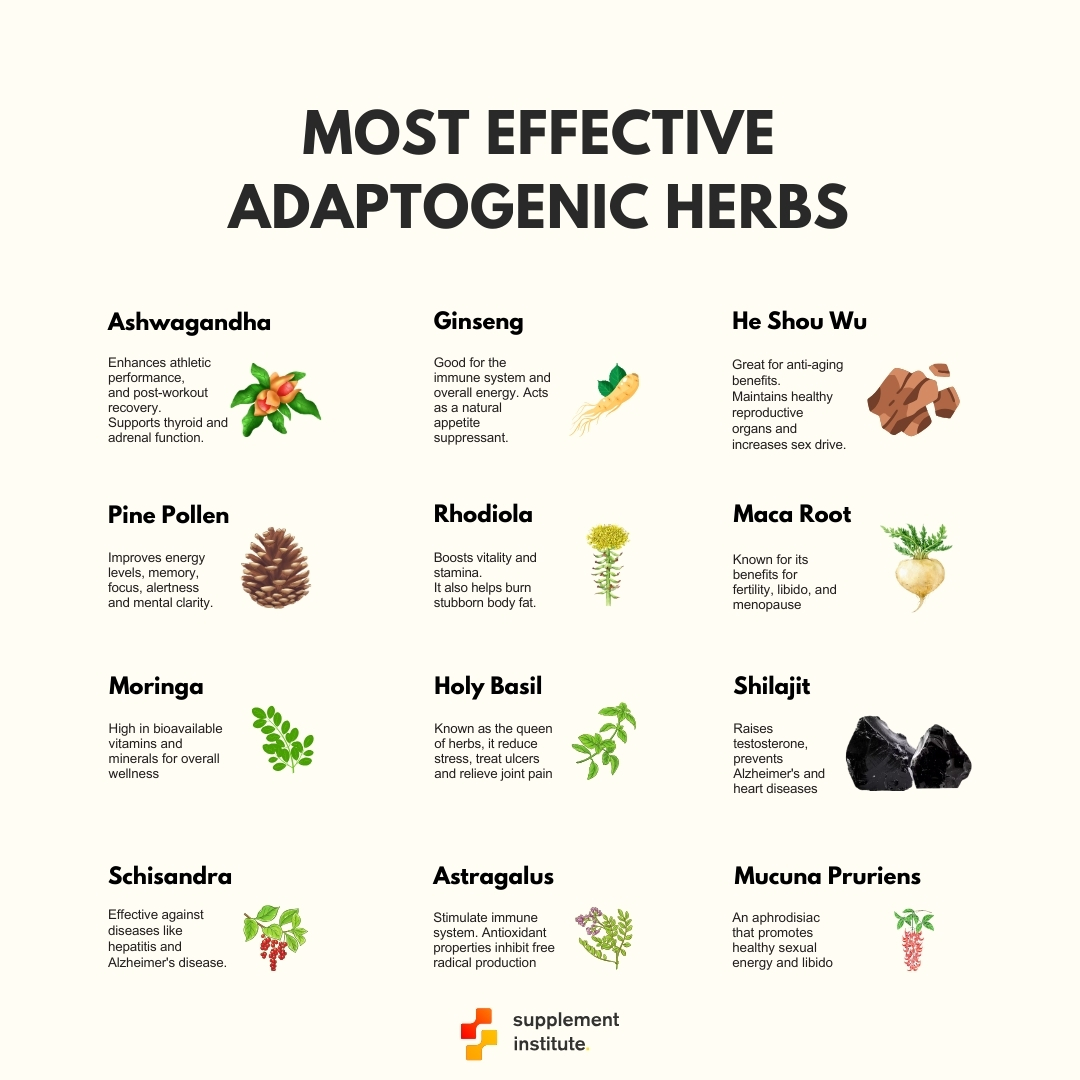What Are Adaptogens and How Do They Help Manage Anxiety

Adaptogens have been getting a lot of attention lately. If you’re someone who’s trying to manage stress or improve your overall well-being, you might have come across the term. But what are adaptogens, and how are they helpful? In our daily lives, stress comes at us from all directions—work, family, the constant barrage of information from our devices. It’s no wonder that people are looking for ways to better manage stress and its effects on the body. Adaptogenic herbs and mushrooms have been used for centuries in various traditional medicine systems. Now they’re being studied and incorporated into modern wellness routines.
What Are Adaptogens?
Adaptogens, as the name suggests, are substances that help the body adapt to stress. But what does that really mean? Adaptogens work by supporting the adrenal glands, which are responsible for managing your body’s response to stress. They help to balance hormones, particularly cortisol, which is known as the stress hormone. By regulating cortisol levels, adaptogens can reduce the impact of stress on the body, whether it’s physical, emotional, or environmental.
You might be wondering how something natural can be so effective in helping the body manage stress. The key lies in the way adaptogens interact with the hypothalamic-pituitary-adrenal (HPA) axis, the central part of our stress response system. This system controls the release of cortisol and other stress-related hormones. When you’re constantly stressed, your HPA axis can get out of balance, leading to a range of issues like fatigue, anxiety, and even immune system suppression. Adaptogens work to bring this system back into balance, which can lead to improved energy levels, better mood, and enhanced resilience to stress.
Adaptogenic Herbs
There are plenty of adaptogenic herbs, each with its own unique properties and benefits, so it’s worth exploring which ones might be the best fit for your needs.

Ashwagandha
Ashwagandha is probably one of the most well-known adaptogens. It’s been used in Ayurvedic medicine for centuries to help with stress and anxiety. Ashwagandha is particularly effective at lowering cortisol levels, making it a great choice for anyone dealing with chronic stress. It’s also been shown to improve sleep, increase energy levels, and support overall mental well-being.
Related: Benefits of Ashwagandha for Women
Rhodiola Rosea
Another popular adaptogen is often used for its ability to reduce fatigue and improve mental performance. This herb is especially beneficial for those who experience physical or mental exhaustion. Rhodiola works by enhancing the body’s resistance to stress, improving mood, and even helping to fight depression. It’s a great option if you’re looking to boost your endurance and resilience, whether it’s for a tough workweek or a demanding workout routine.
Holy Basil
Also known as Tulsi, holy basil is a sacred plant in India with a rich history in traditional medicine. It’s revered for its ability to promote calm and mental clarity. Holy Basil helps to lower cortisol levels, much like Ashwagandha, but it also has the added benefit of supporting the immune system. This makes it a great choice if you’re feeling run down or if you’re in need of some extra support during cold and flu season.
Ginseng
Ginseng is known for its energy-boosting properties. It’s particularly popular in Asian medicine, where it’s used to increase physical stamina and mental clarity. Ginseng can be a bit more stimulating than other adaptogens. It’s often recommended for those who need a little extra help staying focused and energized throughout the day.
Reishi Mushroom
Reishi mushroom isn’t a herb, but it’s one of the most well-known adaptogens in the mushroom family. Often referred to as the “mushroom of immortality” because of its wide-ranging benefits, reishi is known to support the immune system, reduce stress, and promote restful sleep. This mushroom is a great choice if you’re looking to strengthen your body’s defenses while also calming your mind.
How to Use Adaptogens
Incorporating adaptogens into your daily routine doesn’t have to be complicated. They can be taken in various forms, such as capsules, powders, or teas, depending on what fits best into your lifestyle. The key is consistency—adaptogens work best when taken regularly over time.
If you’re new to adaptogens, you might want to start with one herb at a time to see how your body responds. For example, you could begin with Ashwagandha, taking it daily for a few weeks to notice any changes in your stress levels or energy. Once you’re comfortable, you can experiment with adding another adaptogen like Rhodiola or Holy Basil.
Adaptogens can be taken at different times of the day, depending on their effects. For instance, Ashwagandha is often taken in the evening because of its calming properties, while Ginseng might be better suited for the morning to help kickstart your day. It’s also important to note that adaptogens can have cumulative effects, meaning their benefits build up over time, so patience is key.
When it comes to dosage, it’s always best to follow the recommendations on the product label or consult with a healthcare professional. Especially if you’re dealing with specific health conditions or taking other medications. Some people prefer to take adaptogens in powder form, mixing them into smoothies and teas or even sprinkling them on food. This can be a convenient way to incorporate them into your diet without the need for additional supplements.
How Adaptogens Manage Stress
One of the primary reasons people turn to adaptogens is for their stress-relieving properties. But how exactly do they work to manage stress? The answer lies in their ability to modulate the body’s stress response, particularly through their interaction with the HPA axis.
When you’re faced with stress, your body’s initial reaction is to release cortisol. This hormone is essential for dealing with immediate threats. But in today’s world, those “threats” can be anything from an overflowing inbox to a traffic jam. Constantly high levels of cortisol can lead to a host of problems, including anxiety, depression, and even chronic illnesses like heart disease and diabetes.
Adaptogens help by regulating the release of cortisol, ensuring that it’s released when needed but not in excess. They also support the body’s other systems that are impacted by stress, such as the immune system, digestive system, and even cognitive function. Adaptogens keep cortisol levels in check and support these systems. This helps create a sense of balance in the body, making it easier to cope with stress without feeling overwhelmed.
Another way adaptogens manage stress is by supporting the production of neurotransmitters like serotonin and dopamine, which play a crucial role in mood regulation. For example, Rhodiola Rosea has been shown to increase the levels of serotonin in the brain. This can help improve mood and reduce symptoms of depression. Holy Basil can help stabilize blood sugar levels, preventing energy crashes that often contribute to feelings of stress and anxiety.
Which Adaptogen Is for You?
With so many adaptogens to choose from, it can be challenging to know which one is right for you. The best approach is to consider your specific needs and goals. Are you looking to reduce anxiety, improve energy levels, or support your immune system? Different adaptogens offer different benefits, so it’s worth taking the time to find the one that best aligns with your health goals.
If you’re primarily looking to manage stress and anxiety, ashwagandha might be your best bet. It’s widely recognized for its ability to lower cortisol levels and promote a sense of calm. For those dealing with fatigue or needing an energy boost, ginseng or rhodiola rosea could be more suitable. They’re both known for their ability to increase stamina and improve mental clarity.
If you’re interested in overall immune support, reishi mushroom is a great option. It is especially valuable during the colder months when your immune system could use some extra help. For those looking to support hormonal balance, especially women dealing with PMS or menopause symptoms, holy basil is an excellent choice. It not only helps with stress but also supports the endocrine system, making it easier to maintain balanced hormone levels.
Ultimately, the best way to determine which adaptogen is right for you is to try it out and see how your body responds. Adaptogens can be combined to create a synergistic effect, enhancing their overall benefits. For some, a combination of adaptogens might work best to provide comprehensive support for both body and mind.
Final Thoughts
Adaptogens offer a natural way to support your body’s ability to cope with stress. By incorporating adaptogens into your daily routine, you can help manage stress, improve your energy levels, and support your overall well-being. While adaptogens are powerful allies in managing stress, they work best when combined with a healthy lifestyle. Regular exercise, a balanced diet, and sufficient sleep are all crucial components of maintaining overall wellness. Adaptogens are not a magic bullet, but they can play a significant role in supporting your health and helping you navigate the stresses of everyday life with greater ease and resilience.
Building a Stronger You
Supplement Institute is the fruit of extensive online publishing experience, spanning the breadth of SEO strategies to the nuances of paid advertisements. Our journey, marked by significant achievements and learning moments, inspires our core mission: to empower our readers with an abundance of information. By sharing insights and key learnings, we aim to provide you with the knowledge needed to navigate the complex world of supplements, helping you make well-informed decisions for your health and well-being. Welcome to Supplement Institute, where information is your greatest supplement.